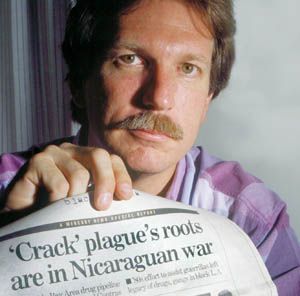
Investigative journalist Gary Webb’s conflict with major media outlets is portrayed in a new film.
Kill the Messenger, a captivating movie now playing in theaters nationwide, tells a revealing story not only of the US government’s dirty secrets, but of how the major media can control public awareness, and punish those who step out of line.
That the CIA has been complicit in the illegal drug trade has been irrefutably established by investigative journalists over the years, going back to the Vietnam War and before. In 1972, Alfred McCoy’s groundbreaking book The Politics of Heroin in Southeast Asia documented CIA involvement in heroin trafficking. During the Reagan administration in 1985, reporters Robert Parry and Brian Barger of the Associated Press revealed that the CIA was participating in the transportation of cocaine into the United States to support the illegal Contra War in Nicaragua. In 1988, the Empowerment Project’s documentary Coverup: Behind the Iran Contra Affair included prison interviews with convicted traffickers who explained how they flew cocaine into the US, using the same planes that the CIA used to transport weapons to the Contras.
All of this was largely ignored by the the major media, which succeeded in keeping the embarrassing story out of public awareness. At least until a courageous journalist named Gary Webb discovered some shocking new information in 1996, and published the results of his investigation in the San Jose Mercury News. In a series of articles called Dark Alliance, he exposed how the crack cocaine epidemic in Los Angeles and other cities was fed by the CIAs complicity in importing cocaine into the US.
By the standards of the relatively young Internet at the time, the story went viral. Outrage erupted in LA’s African American community where a crack epidemic had been ravaging South Central neighborhoods.
The major media was caught flat-footed. Rather than pursuing the story further themselves, they either ignored it completely or tried to discredit Webb and his reporting. In particular, the Los Angeles Times, the Washington Post and the New York Times launched a coordinated campaign. No doubt motivated by their desire to maintain friendly relations with their government sources, and to obscure their own deliberate failure to investigate the story, they focused on smearing Webb and his reporting.
Unfortunately, they were all too successful. The editors at San Jose Mercury News were intimidated into pulling Dark Alliance from their website, even as Webb was about to publish more reports. They took him off the beat and consigned him to an innocuous job, which he eventually quit. With his credibility destroyed, he wasn’t able to work again as a journalist, and in 2004 he was found dead from gunshots to the head, a presumed suicide.
Gary Webb’s tragic story was not widely known in the years that followed. Kill the Messenger, based on Nick Schou’s book of the same name, finally brings this story to a wide audience. It does an outstanding job of revealing what would otherwise remain buried and hidden from the public consciousness.
-David Kasper
